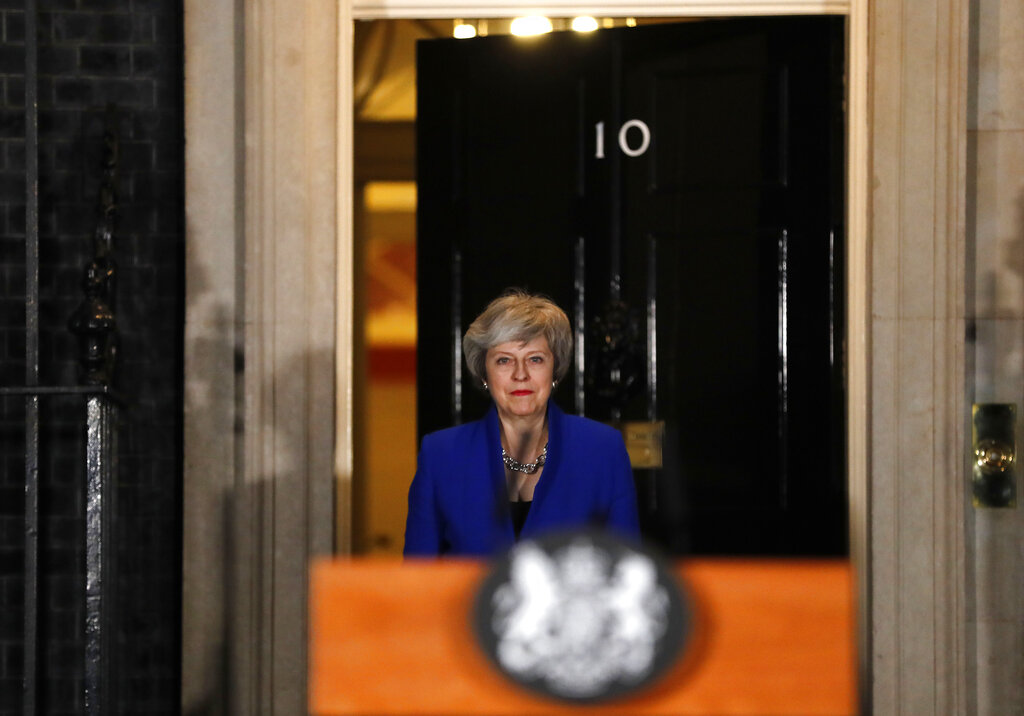May battles to keep Brexit on track after no-confidence win

British Prime Minister Theresa May arrives to speak outside 10 Downing street in London, Wednesday, Jan. 16, 2019. May’s government survived a no-confidence vote Wednesday called after May’s Brexit deal was overwhelmingly rejected by lawmakers. (AP Photo/Frank Augstein)
LONDON — British Prime Minister Theresa May is reaching out to opposition parties and other lawmakers Thursday in a battle to put Brexit back on track after surviving a no-confidence vote.
European Union countries are also debating on how to move forward now that the U.K. Parliament has rejected May’s Brexit withdrawal deal with the bloc and with the prospect of an abrupt “no-deal” departure on the March 29 exit date looming.
Parliament overwhelmingly rejected the deal on Tuesday night, in a crushing defeat for May, who suffered the worst parliamentary defeat in modern British history. Opposition leader
Jeremy Corbyn of the Labour Party immediately called for a no-confidence vote, but May’s minority government survived it on Wednesday night, with crucial backing from the Democratic Unionist Party of Northern Ireland.
May invited opposition leaders for talks about how best to avoid leaving the EU without an agreement. But Corbyn has so far declined to meet with May unless she takes the “no-deal” possibility off the table.
Former Prime Minister Tony Blair, a longtime Labour Party leader, told BBC on Thursday that it would be “sensible” for Corbyn to meet with May to better define the type of Brexit that Britain wants. He warned that a “no-deal” Brexit would do substantial harm to Britain’s economy.
EU countries have generally reacted to the Brexit political crisis unfolding in the U.K. by putting the onus on the British government and its lawmakers to decide what they want to do.
Some British lawmakers want May to call for an extension of negotiations with the EU and postpone the March 29 deadline to leave the bloc, while others are lobbying for a second Brexit referendum. The prime minister has so far rejected those options and is sticking with “no-deal” as a real possibility.
France’s prime minister is a holding a special government meeting Thursday on how his country will cope with a possible “no-deal” Brexit.
The French parliament adopted a law Wednesday allowing emergency measures after March 30 in the event Britain leaves without a deal.
Such measures could aim to reduce problems in cross-border trade and transport, notably through the Eurotunnel beneath the English Channel, and allow British workers and retirees based in France temporary permission to stay until a longer-term deal is worked out.
EU Brexit negotiator Michel Barnier, who said Wednesday in Strasbourg that he was more concerned than ever about the possibility of Britain leaving the EU without an agreement, met with officials in Portugal’s capital on Thursday.
Barnier told a news conference in Lisbon that the red lines set out by Britain’s negotiators have “shut doors.”
“If (the red lines) change, we’ll change,” Barnier said of the EU’s negotiating position.
He said the withdrawal agreement is “balanced, respectful” and said the EU hadn’t reached such an “ambitious” agreement with any other non-EU country.
In general, EU negotiators have found Britain to be inflexible in its desire to retain some of the economic advantages of trading freely with the bloc’s countries while ending the free movement of European citizens into Britain and abiding by other EU guiding principles. /muf